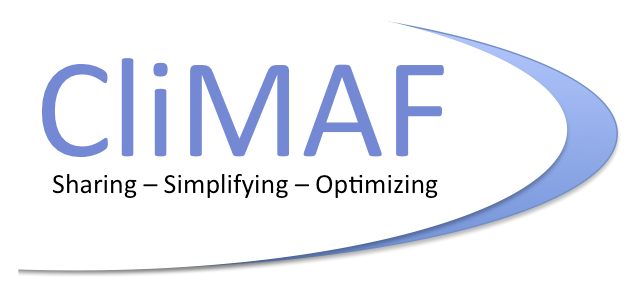Quick links : News | Functions |
Standard operators and functions | HowTo... | Examples | Contents

CliMAF - a Climate Model Assessment Framework
CliMAF is an Open Source software, distributed
with a GPL-compatible licence. See the licence notice.
It is available at CliMAF GitHub repository
The aim of CliMAF is to allow for an actual, easy, collaborative development of climate model outputs assessment suites by climate scientists with varied IT background, and to ultimately share such suites for the benefit of the Climate Science.
So, CliMAF can be described as :
- an aid for handling access to common climate
simulations and re-analysis datafiles, and to personnal data
files, in a uniform way
- a wrapper which provides you with uniform, handy, combination and caching
features around :
- your own post-processing and analysis scripts and programs
- other tools sets such as NCO and CDO operators
- a way to share advanced climate diagnostic modules
- an actual repository for such modules
- and a visualisation engine for the corresponding results
Description
CliMAF is basically a Python-scriptable way to process NetCDF CF compliant climate model outputs which allows:
- to almost forget about accessing input data : you refer to
‘variables’ in ‘simulations’, CliMAF knows a bunch of data
organization schemes, you just quote some root locations, usually in
configuration files ; [ under development : data can also be on the
ESGF ]
- to apply diagnostics (i.e. any post-processing module) coded in
any langage, provided they meet very minimal requirements, such as
described in section Operators : using external scripts, binaries and python functions ; they can be :
- either binaries, which accepts command-line arguments, read NetCDF
files, and output NetCDF files or graphics (yet only in PNG format)
- or Python function which accept Masked Arrays data structure as inputs and outputs
- to easily pipe and combine such diagnostic binaries or functions
- to describe the piping using Python scripting, thus building formal
expressions in a simple syntax (called CRS for CliMAF Reference Syntax)
- to trigger CRS expression computation only once needed
- to handle a cache of results, which access keys are CRS expressions
A very low-profile knowledge of Python is enough to take full advantage of CliMAF
Content
See the full, extended table at Contents
